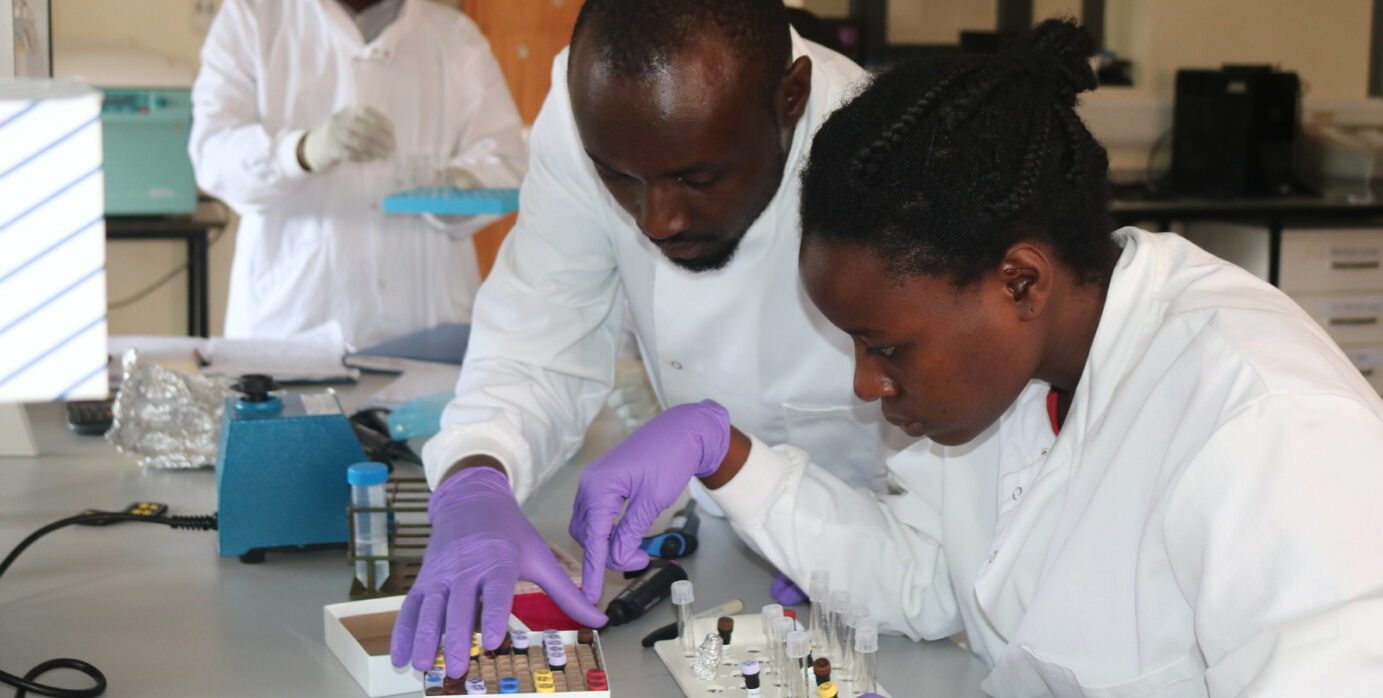The Medical Research Council (MRC)-funded Research Units (a) and Wellcome-funded Africa and Asia Programmes (b) are major centres and platforms that embed research capacity strengthening to be centres of excellence.
| UK Funders | BEIS via UKRI-MRC |
| Funding programme | Core funding from UKRI-MRC, European and Developing Countries Clinical Trials Partnership (EDCTP) |
| Total UK investment | £97M over the 5 years (2016/17-2020/21). £68.7M to MRCG and £28.3M to MRC/UVRI and LSHTM Uganda Research Unit |
| Project dates | 1988-present |
| Countries of focus | Uganda and The Gambia |
| Model/approaches to RCS | Centres of excellence centred around building research capacity in their respective countries |
| Find out more | MRC Uganda | LSHTM; MRC Gambia | LSHTM |
Background
The MRC Unit The Gambia at London School of Hygiene & Tropical Medicine (LSHTM) (MRCG) (est. 1947) vision is to lead health research in West Africa to save lives and improve health across the world. RCS is interwoven in its mission statements, notably ‘To train and develop MRCG staff to increase capacity in health research in the West African Region and beyond’. In 2016, the unit set up a dedicated ‘Research Training and career development department’. The MRC/Uganda Virus Research Institute (UVRI) and LSHTM Uganda Research Unit (est. 1988) is a centre of excellence for research on HIV/AIDs, emerging and re-emerging infections and non-communicable diseases (NCDs). Part of their mission is to build capacity for research in Africa. The Unit has a five-year training plan (2017-2022) to develop capacity for scientists and support staff at the unit and the region.
Impacts at MRCG
Provision and quality of training
-
Since 2016, 600 individuals on average per year have been trained through internships, BSc, MSc, PhD, certified professional and other skills training. Countries supported include Kenya, Nigeria, Ghana, Senegal and The Gambia in collaboration with the Medical Research Foundation and West African Health Organisation.
-
The MRCG Retention Program enabled the unit to achieve 95% of lab-based technical support staff with at least a BSc degree (up from 30% 10 years ago).
-
In 2020, support was provided to other West African countries to increase capacity in genomic sequencing, creating impact for the COVID-19 response and beyond.
-
The Unit is setting up an internationally accredited fieldworker training programme with institutions in Kenya, Ghana and South Africa (among others).
MCRG wider RCS programmes and networks
-
Hosts the charity Africa Research Excellence Fund (AREF), dedicated to overcoming barriers faced by African researchers. To date, it has provided 46 fellowships, grant writing workshops to >170 attendees and 30 leadership programme fellows.
-
Co-leads the West Africa Network of Excellence for tuberculosis, AIDS and Malaria (WANETAM) with the Institute for Health Research, Epidemiological Surveillance and Training (IRESSEF) in Senegal to build capacity to prepare West African sites for clinical trials.
-
Hosts three postdoctoral fellows from Senegal, Benin and The Gambia through the Crick African Network (CAN), a partnership with the Francis Crick Institute in the UK.
Impacts at MRC/UVRI and LSHTM Uganda Research Unit
Career pathways and quality training
- To date, over 100 PhDs and 160 MSc have been supported.
- Multiple training opportunities are open to non-Ugandans, the current PhD and post doc cohorts include fellows from Cameroon, Ethiopia, Kenya, Malawi and Nigeria.
- Contributed to training of Ugandan Government laboratory technologists and scientists in virus sequencing, immunology/flow cytometry and bioinformatics, which has been vital in responding to the Covid-19 pandemic.
Strengthened research environment
- Major partner in the East Africa Consortium for Clinical Research (EACCR), which significantly improved the regional quality and ethics of health research by developing a rigorous reciprocal clinical trial monitoring mechanism.
- MRC-Wellcome co-funded facility “The Training Building”, opened in 2015, has enhanced the Unit’s capacity to hold training events, seminars and symposia. Monthly scientific seminars and several bioinformatics courses have been run since.
Success factors and lessons learned
- Long term support has enabled the Units to develop a broad approach to RCS to support their diverse workforce from lab technicians to fieldworkers.
- The Units offer sustained career development pathways, which helps deliver equity (e.g. gender equity).
- The Units were able to rapidly redeploy staff and resources to support the national Covid-19 responses.
- The Units have forged strong relationships with the Health Ministries to increase the potential for policy impact.
- The Units work regionally to knowledge share and strengthen research capacity.
Future vision
The Units will focus on strengthening individual postgraduate training to sustain scientific excellence and develop research leaders. Both Units will capitalise on the recent transfer to LSHTM to further enhance training.
